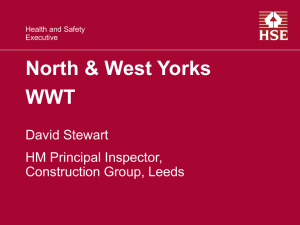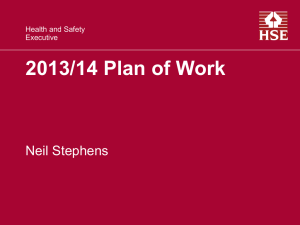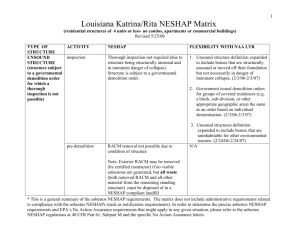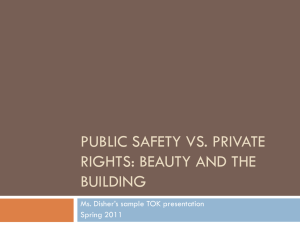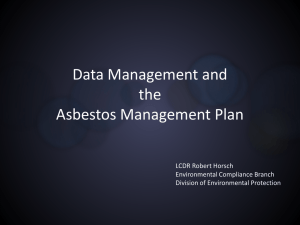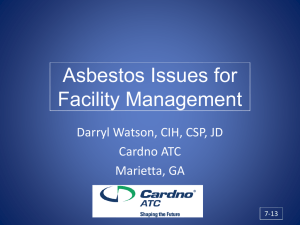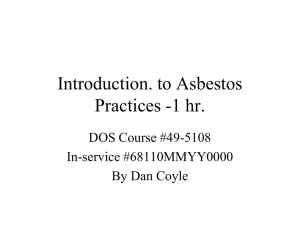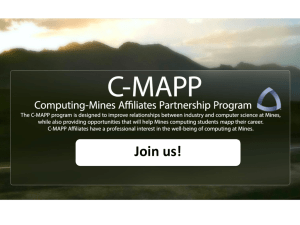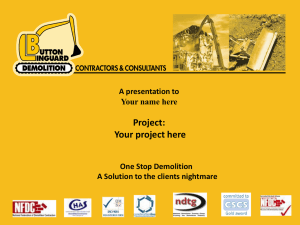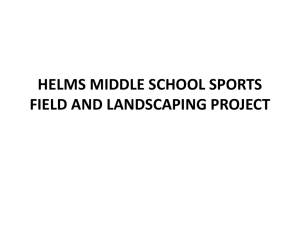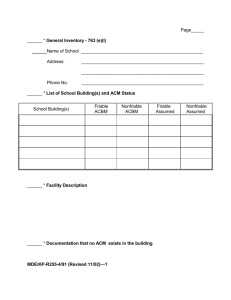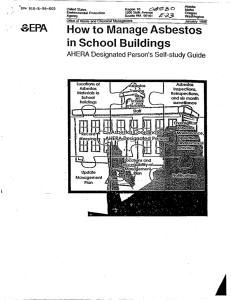Asbestos Regulatory Overview
advertisement
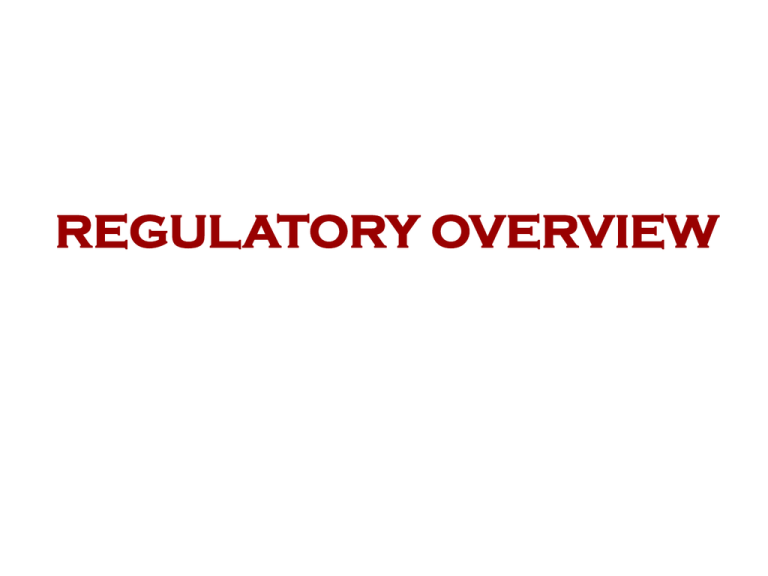
REGULATORY OVERVIEW FEDERAL ASBESTOS REGULATIONS OSHA OSHA 29 •OSHA 29CFR CFR1926.1101 1926.1101 •OSHA 29 CFR 1910.1001 •RESPIRATORY PROTECTION 29 CFR 1910.134 EPA NESHAP 40 •NESHAP 40CFR CFR61, 61,Subpart SubpartM M AHERA 40 •AHERA •AHERA 40 CFR CFR 763, 763, Subpart Subpart E E •WORKER PROTECTION 40 CFR 763, Subpart G •ASHARA (Model Accreditation Plan) SCOPE OF FEDERAL REGULATIONS OSHA: Work Site Procedures For Worker Protection NESHAP: Waste Generation and Management AHERA: Identification and Management in Buildings MAP: Certification of Persons SCOPE & APPLICABILITY OF OSHA •Applies wherever a worker works who may be exposed to asbestos • Requires employers to protect employees • The building owner is an employer • A notification regulation for building owners • A specification regulation for contractors •Generally applies even when EPA does not OSHA DOES NOT REQUIRE THE WORK TO BE DONE, BUT REGULATES THE WORK PROCEDURES IF AN EMPLOYEE DISTURBS OR CONTACTS ASBESTOS. OSHA GIVES US WORK PRACTICES! CLASSES OF WORK DEFINITIONS Class I Work The removal of TSI, fireproofing or popcorn Class II Work The removal of anything else Class III Work The small scale, short duration disturbance of ACM Class IV Work Contact, but no disturbance, or cleanup of previously generated debris CLASSES OF WORK APPLICATION Class I Work Requires NPE, shower decon, full PPE, certified people, air monitoring, NEA Class II Work No initial NPE, NEA exemptions for shower decon, PPE, certified workers, air monitoring. One day training. Class III Work Requires PPE for TSI & Surfacing, NEA exemptions for all other ACM. Two day training. SS, SD only. Class IV Work Requires NEA, all exemptions allowed, 2 hour training required. SCOPE & APPLICABILITY OF NESHAP Applies to all facilities except single residential buildings having 4 living units or less. REQUIRES A THOROUGH INSPECTION BEFORE DISTURBANCE •Requires controlled removal of RACM about to be disturbed by DEMOLITION or RENOVATION •Requires prior notification to EPA •Requires proper management thru & after disposal •No visible emissions NESHAP REQUIRES CONTROLLED REMOVAL OF ASBESTOS, BY REGULATING THE GENERATION, MANAGEMENT AND DISPOSAL OF THE WASTE. NESHAP IS ASBESTOS WASTE MANAGEMENT! Applicability (a) 61.145 Standard for Demolition and Renovation (a) Applicability. To determine which requirements of paragraphs (a), (b) and (c) of this section apply to the owner or operator of a demolition or renovation activity and prior to the commencement of the demolition or renovation, thoroughly inspect the affected facility or part of the facility where the demolition or renovation operation will occur for the presence of asbestos, including Category I and Category II nonfriable ACM. (a) Applicability (b) Notification Requirements (c) Procedures for Asbestos Emission Control Definitions (cont.) Regulated Asbestos Containing Material (RACM) a) Friable asbestos containing material b) Category I nonfriable ACM that has become friable c) Category I nonfriable ACM that will be or has been subjected to sanding, grinding, cutting or abrading d) Category II nonfriable ACM that has a high probability of becoming or has become crumbled, pulverized, or reduced to powder by the forces expected to act on the material in the course of demolition or renovation operations e) EPA says that the material is RACM Definitions (cont.) Nonfriable ACM Categories Category I nonfriable ACM: asbestos-containing packings, gaskets, resilient floor covering and asphalt roofing products containing more than 1% asbestos. IN GOOD CONDITION. Category II nonfriable ACM: any material, excluding Category I nonfriable ACM, containing more than 1% asbestos that when dry, cannot be crumbled, pulverized or reduced to powder by hand pressure. IN GOOD CONDITION. Rule of Thumb: a material would not be Category I or II non-friable ACM if it cannot be removed without significant breakage (i.e. rendered friable). The material would be RACM. SCOPE & APPLICABILITY OF AHERA Applies in schools Requires identification of all ACBM Requires safe management of ACBM Industry standards for identification & management Contains the Model Accreditation Plan (appendix C) AHERA TELLS US WHAT IS ASBESTOS AND WHAT IS NOT, AND REQUIRES THAT ACBM BE MANAGED SAFELY IN OCCUPIED SCHOOL BUILDINGS. AHERA DOES NOT REQUIRE REMOVAL ! MAJOR OBJECTIVES OF AHERA •IDENTIFICATION OF ALL ACBM •EVALUATION OF HAZARDS •SAFE MANAGEMENT OF ACBM AHERA FACILITIES SCHOOLS •KINDERGARTEN - 12 •PUBLIC AND PRIVATE •NOT FOR PROFIT AHERA CONCEPTS USED UNIVERSALLY •ACCREDITATION •ASBESTOS INSPECTION PROTOCOL •NVLAP CERTIFIED LABORATORIES •RESPONSE ACTIONS •O & M PROGRAMS •FORMAL PROJECT DESIGN •FINAL CLEARANCE. SCOPE & APPLICABILITY OF MAP •Applies in all buildings except residential housing through 10 units •Requires certification of inspectors •Requires certification of persons who design or conduct response actions: Project Designers Contractor/Supervisors Workers •Requires certified specifications The Model Accreditation Plan is an EPA regulation that came out of AHERA, and as such, it applies to Response Actions (friable abatement), inside buildings. SCOPE of the MAP •Requires accreditation of training curriculums. •Requires certification of people who design and conduct response actions. •Requires certification of asbestos inspectors. DEFINITIONS • RESPONSE ACTION: A response to •Friable ACM •Inside the building •Bigger than SS/SD Application of the MAP When addressing a Response Action, the following is required: •Formal specs done by a certified Project Designer •Contractor/Supervisor certification of the competent person •Worker certification of all workers
